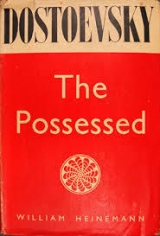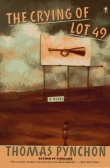
Текст книги "The Possessed"
Автор книги: Федор Достоевский
сообщить о нарушении
Текущая страница: 22 (всего у книги 49 страниц)
The Possessed, by Fyodor Dostoyevsky
Chapter IV. All in Expectation
The impression made on the whole neighbourhood by the story of the duel, which was rapidly noised abroad, was particularly remarkable from the unanimity with which every one hastened to take up the cudgels for Nikolay Vsyevolodovitch. Many of his former enemies declared themselves his friends. The chief reason for this change of front in public opinion was chiefly due to one person, who had hitherto not expressed her opinion, but who now very distinctly uttered a few words, which at once gave the event a significance exceedingly interesting to the vast majority. This was how it happened. On the day after the duel, all the town was assembled at the Marshal of Nobility's in honour of his wife's nameday. Yulia Mihailovna was present, or, rather, presided, accompanied by Lizaveta Nikolaevna, radiant with beauty and peculiar gaiety, which struck many of our ladies at once as particularly suspicious at this time. And I may mention, by the way, her engagement to Mavriky Nikolaevitch was by now an established fact. To a playful question from a retired general of much consequence, of whom we shall have more to say later, Lizaveta Nikolaevna frankly replied that evening that she was engaged. And only imagine, not one of our ladies would believe in her engagement. They all persisted in assuming a romance of some sort, some fatal family secret, something that had happened in Switzerland, and for some reason imagined that Yulia Mihailovna must have had some hand in it. It was difficult to understand why these rumours, or rather fancies, persisted so obstinately, and why Yulia Mihailovna was so positively connected with it. As soon as she came in, all turned to her with strange looks, brimful of expectation. It must be observed that owing to the freshness of the event, and certain circumstances accompanying it, at the party people talked of it with some circumspection, in undertones. Besides, nothing yet was known of the line taken by the authorities. As far as was known, neither of the combatants had been troubled by the police. Every one knew, for instance, that Gaganov had set off home early in the morning to Duhovo, without being hindered. Meanwhile, of course, all were eager for some one to be the first to speak of it aloud, and so to open the door to the general impatience. They rested their hopes on the general above-mentioned, and they were not disappointed.
This general, a landowner, though not a wealthy one, was one of the most imposing members of our club, and a man of an absolutely unique turn of mind. He flirted in the old-fashioned way with the young ladies, and was particularly fond, in large assemblies, of speaking aloud with all the weightiness of a general, on subjects to which others were alluding in discreet whispers. This was, so to say, his 'special role in local society. He drawled, too, and spoke with peculiar suavity, probably having picked up the habit from Russians travelling abroad, or from those wealthy landowners of former days who had suffered most from the emancipation. Stepan Trofimovitch had observed that the more completely a landowner was ruined, the more suavely he lisped and drawled his words. He did, as a fact, lisp and drawl himself, but was not aware of it in himself.
The general spoke like a person of authority. He was, besides, a distant relation of Gaganov's, though he was on bad terms with him, and even engaged in litigation with him. He had, moreover, in the past, fought two duels himself, and had even been degraded to the ranks and sent to the Caucasus on account of one of them. Some mention was made of Varvara Petrovna's having driven out that day and the day before, after being kept indoors “by illness,” though the allusion was not to her, but to the marvellous matching of her four grey horses of the Stavrogins' own breeding. The general suddenly observed that he had met “young Stavrogin” that day, on horseback. . . . Every one was instantly silent. The general munched his lips, and suddenly proclaimed, twisting in his fingers his presentation gold snuff-box.
“I'm sorry I wasn't here some years ago ... I mean when I was at Carlsbad . . . H'm! I'm very much interested in that young man about whom I heard so many rumours at that time. H'm! And, I say, is it true that he's mad? Some one told me so then. Suddenly I'm told that he has been insulted by some student here, in the presence of his cousins, and he slipped under the table to get away from him. And yesterday I heard from Stepan Vysotsky that Stavrogin had been fighting with Gaganov. And simply with the gallant object of offering himself as a target to an infuriated man, just to get rid of him. H'm! Quite in the style of the guards of the twenties. Is there any house where he visits here?”
The general paused as though expecting an answer. A way had been opened for the public impatience to express itself.
“What could be simpler?” cried Yulia Mihailovna, raising her voice, irritated that all present had turned their eyes upon her, as though at a word of command. “Can one wonder that Stavrogin fought Gaganov and took no notice of the student? He couldn't challenge a man who used to be his serf!”
A noteworthy saying! A clear and simple notion, yet it had entered nobody's head till that moment. It was a saying that had extraordinary consequences. All scandal and gossip, all the petty tittle-tattle was thrown into the background, another significance had been detected. A new character was revealed whom all had misjudged; a character, almost ideally severe in his standards. Mortally insulted by a student, that is, an educated man, no longer a serf, he despised the affront because his assailant had once been his serf. Society had gossiped and slandered him; shallow-minded people had looked with contempt on a man who had been struck in the face. He had despised a public opinion, which had not risen to the level of the highest standards, though it discussed them.
“And, meantime, you and I, Ivan Alexandrovitch, sit and discuss the correct standards,” one old club member observed to another, with a warm and generous glow of self-reproach.
“Yes, Pyotr Mihailovitch, yes,” the other chimed in with zest, “talk of the younger generation!”
“It's not a question of the younger generation,” observed a third, putting in his spoke, “it's nothing to do with the younger generation; he's a star, not one of the younger generation; that's the way to look at it.”
“And it's just that sort we need; they're rare people.” The chief point in all this was that the “new man,” besides showing himself an unmistakable nobleman, was the wealthiest landowner in the province, and was, therefore, bound to be a leading man who could be of assistance. I've already alluded in passing to the attitude of the landowners of our province. People were enthusiastic:
“He didn't merely refrain from challenging the student. He put his hands behind him, note that particularly, your excellency,” somebody pointed out.
“And he didn't haul him up before the new law-courts, either,” added another.
“In spite of the fact that for a personal insult to a nobleman he'd have got fifteen roubles damages! He he he!”
“No, I'll tell you a secret about the new courts,” cried a third, in a frenzy of excitement, “if anyone's caught robbing or swindling and convicted, he'd better run home while there's yet time, and murder his mother. He'll be acquitted of everything at once, and ladies will wave their batiste handkerchiefs from the platform. It's the absolute truth!”
“It's the truth. It's the truth!”
The inevitable anecdotes followed: Nikolay Vsyevolodovitch's friendly relations with Count K. were recalled. Count K.'s stern and independent attitude to recent reforms was well known, as well as his remarkable public activity, though that had somewhat fallen off of late. And now, suddenly, every one was positive that Nikolay Vsyevolodovitch was betrothed to one of the count's daughters, though nothing had given grounds for such a supposition. And as for some wonderful adventures in Switzerland with Lizaveta Nikolaevna, even the ladies quite dropped all reference to it. I must mention, by the way, that the Drozdovs had by this time succeeded in paying all the visits they had omitted at first. Every one now confidently considered Lizaveta Nikolaevna a most ordinary girl, who paraded her delicate nerves. Her fainting on the day of Nikolay Vsyevolodovitch's arrival was explained now as due to her terror at the student's outrageous behaviour. They even increased the prosaicness of that to which before they had striven to give such a fantastic colour. As for a lame woman who had been talked of, she was forgotten completely. They were ashamed to remember her.
“And if there had been a hundred lame girls – we've all been young once!”
Nikolay Vsyevolodovitch's respectfulness to his mother was enlarged upon. Various virtues were discovered in him. People talked with approbation of the learning he had acquired in the four years he had spent in German universities. Gaganov's conduct was declared utterly tactless: “not knowing friend from foe.” Yulia Mihailovna's keen insight was unhesitatingly admitted.
So by the time Nikolay Vsyevolodovitch made his appearance among them he was received by every one with naive solemnity. In all eyes fastened upon him could be read eager anticipation. Nikolay Vsyevolodovitch at once wrapped himself in the most austere silence, which, of course, gratified every one much more than if he had talked till doomsday. In a word, he was a success, he was the fashion. If once one has figured in provincial society, there's no retreating into the background. Nikolay Vsyevolodovitch began to fulfil all his social duties in the province punctiliously as before. He was not found cheerful company: “a man who has seen suffering; a man not like other people; he has something to be melancholy about.” Even the pride and disdainful aloofness for which he had been so detested four years before was now liked and respected.
Varvara Petrovna was triumphant. I don't know whether she grieved much over the shattering of her dreams concerning Lizaveta Nikolaevna. Family pride, of course, helped her to get over it. One thing was strange: Varvara Petrovna was suddenly convinced that Nikolay Vsyevolodovitch really had “made his choice “at Count K.'s. And what was strangest of all, she was led to believe it by rumours which reached her on no better authority than other people. She was afraid to ask Nikolay Vsyevolodovitch a direct question. Two or three times, however, she could not refrain from slyly and good-humouredly reproaching him for not being open with her. Nikolay Vsyevolodovitch smiled and remained silent. The silence was taken as a sign of assent. And yet, all the time she never forgot the cripple. The thought of her lay like a stone on her heart, a nightmare, she was tortured by strange misgivings and surmises, and all this at the same time as she dreamed of Count K.'s daughters. But of this we shall speak later. Varvara Petrovna began again, of course, to be treated with extreme deference and respect in society, but she took little advantage of it and went out rarely.
She did, however, pay a visit of ceremony to the governor's wife. Of course, no one had been more charmed and delighted by Yulia Mihailovna's words spoken at the marshal's soiree than she. They lifted a load of care off her heart, and had at once relieved much of the distress she had been suffering since that
luckless Sunday.
“I misunderstood that woman,” she declared, and with her characteristic impulsiveness she frankly told Yulia Mihailovna that she had come to thank her.Yulia Mihailovna was flattered, but she behaved with dignity. She was beginning about this time to be very conscious of her own importance, too much so, in fact. She announced, for example, in the course of conversation, that she had never heard of Stepan Trofimovitch as a leading man or a savant.
“I know young Verhovensky, of course, and make much of him. He's imprudent, but then he's young; he's thoroughly well-informed, though. He's not an out-of-date, old-fashioned critic, anyway.” Varvara Petrovna hastened to observe that Stepan Trofimovitch had never been a critic, but had, on the contrary, spent all his life in her house. He was renowned through circumstances of his early career, “only too well known to the whole world,” and of late for his researches in Spanish history. Now he intended to write also on the position of modern German universities, and, she believed, something about the Dresden Madonna too. In short, Varvara Petrovna refused to surrender Stepan Trofimovitch to the tender mercies of Yulia Mihailovna.
“The Dresden Madonna? You mean the Sistine Madonna? ComeVarvara Petrovna, I spent two hours sitting before that picture and came away utterly disillusioned. I could make nothing of it and was in complete amazement. Karmazinov, too, says it's hard to understand it. They all see nothing in it now, Russians and English alike. All its fame is just the talk of the last generation.”
“Fashions are changed then?”
“What I think is that one mustn't despise our younger generation either. They cry out that they're communists, but what Isay is that we must appreciate them and mustn't be hard on them. I read everything now – the papers, communism the natural sciences – I get everything because, after all, one must know where one's living and with whom one has to do. One mustn't spend one's whole life on the heights of one's own fancy. I've come to the conclusion, and adopted it as a principle, that one must be kind to the young people and so keep them from the brink. Believe me, Varvara Petrovna, that none but we who make up good society can by our kindness and good influence keep them from the abyss towards which they are brought by the intolerance of all these old men. I am glad though to learn from you about Stepan Trofimovitch. You suggest an idea to me: he may be useful at our literary matinee, you know I'm arranging for a whole day of festivities, a subscription entertainment for the benefit of the poor governesses of our province. They are scattered about Russia; in our district alone we can reckon up six of them. Besides that, there are two girls in the telegraph office, two are being trained in the academy, the rest would like to be but have not the means. The Russian woman's fate is a terrible one, Varvara Petrovna! It's out of that they're making the university question now, and there's even been a meeting of the Imperial Council about it. In this strange Russia of ours one can do anything one likes; and that, again, is why it's only by the kindness and the direct warm sympathy of all the better classes that we can direct this great common cause in the true path. Oh, heavens, have we many noble personalities among us! There are some, of course, but they are scattered far and wide. Let us unite and we shall be stronger. In one word, I shall first have a literary matinee, then a light luncheon, then an interval, and in the evening a ball. We meant to begin the evening by living pictures, but it would involve a great deal of expense, and so, to please the public, there will be one or two quadrilles in masks and fancy dresses, representing well-known literary schools. This humorous idea was suggested by Karmazinov. He has been a great help to me. Do you know he's going to read us the last thing he's written, which no one has seen yet. He is laying down the pen, and will write no more. This last essay is his farewell to the public. It's a charming little thing called 'Merci.' The title is French; he thinks that more amusing and even subtler. I do, too. In fact I advised it. I think Stepan Trofimovitch might read us something too, if it were quite short and . . . not so very learned. I believe Pyotr Stepanovitch and some one else too will read something. Pyotr Stepanovitch shall run round to you and tell you the programme. Better still, let me bring it to you myself.”
“Allow me to put my name down in your subscription list too. I'll tell Stepan Trofimovitch and will beg him to consent.”
Varvara Petrovna returned home completely fascinated. She was ready to stand up for Yulia Mihailovna through thick and thin, and for some reason was already quite put out with Stepan Trofimovitch, while he, poor man, sat at home, all unconscious.
“I'm in love with her. I can't understand how I could be so mistaken in that woman,” she said to Nikolay Vsyevolodovitch and Pyotr Stepanovitch, who dropped in that evening.
“But you must make peace with the old man all the same,” Pyotr Stepanovitch submitted. “He's in despair. You've quite sent him to Coventry. Yesterday he met your carriage and bowed, and you turned away. We'll trot him out, you know; I'm reckoning on him for something, and he may still be useful.”
“Oh, he'll read something.”
“I don't mean only that. And I was meaning to drop in on him to-day. So shall I tell him?”
“If you like. I don't know, though, how you'll arrange it,” she said irresolutely. “I was meaning to have a talk with him myself, and wanted to fix the time and place.”
She frowned.
“Oh, it's not worth while fixing a time. I'll simply give hint; the message.”
“Very well, do. Add that I certainly will fix a time to see him though. Be sure to say that too.”
Pyotr Stepanovitch ran off, grinning. He was, in fact, to the best of my recollection, particularly spiteful all this time, and ventured upon extremely impatient sallies with almost every one. Strange to say, every one, somehow, forgave him. It was generally accepted that he was not to be looked at from the ordinary standpoint. I may remark that he took up an extremely resentful attitude about Nikolay Vsyevolodovitch's duel. It took him unawares. He turned positively green when he was told of it. Perhaps his vanity was wounded: he only heard of it next day when every one knew of it.
“You had no right to fight, you know,” he whispered to Stavrogin, five days later, when he chanced to meet him at the club. It was remarkable that they had not once met during those five days, though Pyotr Stepanovitch had dropped in at Varvara Petrovna's almost every day.
Nikolay Vsyevolodovitch looked at him in silence with an absent-minded air, as though not understanding what was the matter, and he went on without stopping. He was crossing the big hall of the club on his way to the refreshment room.
“You've been to see Shatov too. . . . You mean to make it known about Marya Timofyevna,” Pyotr Stepanovitch muttered, running after him, and, as though not thinking of what he was doing he clutched at his shoulder.
Nikolay Vsyevolodovitch shook his hand off and turned round quickly to him with a menacing scowl. Pyotr Stepanovitch looked at him with a strange, prolonged smile. It all lasted only one moment. Nikolay Vsyevolodovitch walked on.
II
He went to the “old man” straight from Varvara Petrovna's, and he was in such haste simply from spite, that he might revenge himself for an insult of which I had no idea at that time. The fact is that at their last interview on the Thursday of the previous week, Stepan Trofimovitch, though the dispute was one of his own beginning, had ended by turning Pyotr Stepanovitch out with his stick. He concealed the incident from me at the time. But now, as soon as Pyotr Stepanovitch ran in with his everlasting grin, which was so naively condescending, and his unpleasantly inquisitive eyes peering into every corner, Stepan Trofimovitch at once made a signal aside to me, not to leave the room. This was how their real relations came to be exposed before me, for on this occasion I heard their whole conversation.
Stepan Trofimovitch was sitting stretched out on a lounge. He had grown thin and sallow since that Thursday. Pyotr Stepanovitch seated himself beside him with a most familiar air, unceremoniously tucking his legs up under him, and taking up more room on the lounge than deference to his father should have allowed. Stepan Trofimovitch moved aside, in silence, and with dignity.
On the table lay an open book. It was the novel, “What's to be done?” Alas, I must confess one strange weakness in my friend; the fantasy that he ought to come forth from his solitude and fight a last battle was getting more and more hold upon his deluded imagination. I guessed that he had got the novel and was studyingit solely in order that when the inevitable conflict with the “shriekers” came about he might know their methods and arguments beforehand, from their very “catechism,” and in that way be prepared to confute them all triumphantly, before her eyes.Oh, how that book tortured him! He sometimes flung it aside in despair, and leaping up, paced about the room almost in a frenzy.
“I agree that the author's fundamental idea is a true one,” he said to me feverishly, “but that only makes it more awful. It's just our idea, exactly ours; we first sowed the seed, nurtured it, prepared the way, and, indeed, what could they say new, after us? But, heavens! How it's all expressed, distorted, mutilated!” he exclaimed, tapping the book with his fingers. “Were these the conclusions we were striving for. Who can understand the original idea in this?”
“Improving your mind?” sniggered Pyotr Stepanovitch, taking the book from the table and reading the title. “It's high time. I'll bring you better, if you like.”
Stepan Trofimovitch again preserved a dignified silence. I was sitting on a sofa in the corner.
Pyotr Stepanovitch quickly explained the reason of his coming. Of course, Stepan Trofimovitch was absolutely staggered, and he listened in alarm, which was mixed with extreme indignation.
“And that Yulia Mihailovna counts on my coming to read for her!”
“Well, they're by no means in such need of you. On the contrary, it's by way of an attention to you, so as to make up to Varvara Petrovna. But, of course, you won't dare to refuse, and I expect you want to yourself,” he added with a grin. “You old fogies are all so devilishly ambitious. But, I say though, you must look out that it's not too boring. What have you got? Spanish history, or what is it? You'd better let me look at it three days beforehand, or else you'll put us to sleep perhaps.”
The hurried and too barefaced coarseness of these thrusts was obviously premeditated. He affected to behave as though it were impossible to talk to Stepan Trofimovitch in different and more delicate language. Stepan Trofimovitch resolutely persisted in ignoring his insults, but what his son told him made a more and more overwhelming impression upon him.
“And she, she herselfsent me this message through you?” he asked, turning pale.
“Well, you see, she means to fix a time and place for a mutual explanation, the relics of your sentimentalising. You've been coquetting with her for twenty years and have trained her to the most ridiculous habits. But don't trouble yourself, it's quite different now. She keeps saying herself that she's only beginning now to 'have her eyes opened.' I told her in so many words that all this friendship of yours is nothing but a mutual pouring forth of sloppiness. She told me lots, my boy. Foo! what a flunkey's place you've been filling all this time. I positively blushed for you.”
“I filling a flunkey's place?” cried Stepan Trofimovitch, unable to restrain himself.
“Worse, you've been a parasite, that is, a voluntary flunkey too lazy to work, while you've an appetite for money. She, too, understands all that now. It's awful the things she's been telling me about you, anyway. I did laugh, my boy, over your letters to her; shameful and disgusting. But you're all so depraved, so depraved! There's always something depraving in charity – you're a good example of it!”
“She showed you my letters!”
“All; though, of course, one couldn't read them all. Foo, what a lot of paper you've covered! I believe there are more than two thousand letters there. And do you know, old chap, I believe there was one moment when she'd have been ready to marry you. You let slip your chance in the silliest way. Of course, I'm speaking from your point of view, though, anyway, it would have been better than now when you've almost been married to 'cover another man's sins,' like a buffoon, for a jest, for money.”
“For money! She, she says it was for money!” Stepan Trofimovitch wailed in anguish.
“What else, then? But, of course, I stood up for you. That's your only line of defence, you know. She sees for herself that you needed money like every one else, and that from that point of view maybe you were right. I proved to her as clear as twice two makes four that it was a mutual bargain. She was a capitalist and you were a sentimental buffoon in her service. She's not angry about the money, though you have milked her like a goat. She's only in a rage at having believed in you for twenty years, at your having so taken her in over these noble sentiments, and made her tell lies for so long. She never will admit that she told lies of herself, but you'll catch it the more for that. I can't make out how it was you didn't see that you'd have to have a day of reckoning. For after all you had some sense. I advised her yesterday to put you in an almshouse, a genteel one, don't disturb yourself; there'll be nothing humiliating; I believe that's what she'll do. Do you remember your last letter to me, three weeks ago?”
“Can you have shown her that?” cried Stepan Trofimovitch, leaping up in horror.
“Rather! First thing. The one in which you told me she was exploiting you, envious of your talent; oh, yes, and that about 'other men's sins.' You have got a conceit though, my boy! How I did laugh. As a rule your letters are very tedious.
You write a horrible style. I often don't read them at all, and I've one lying about to this day, unopened. I'll send it to you to-morrow. But that one, that last letter of yours was the tiptop of perfection! How I did laugh! Oh, how I laughed!”
“Monster, monster!” wailed Stepan Trofimovitch.
“Foo, damn it all, there's no talking to you. I say, you're getting huffy again as you were last Thursday.”
Stepan Trofimovitch drew himself up, menacingly.
“How dare you speak to me in such language?”
“What language? It's simple and clear.”
“Tell me, you monster, are you my son or not?”
“You know that best. To be sure all fathers are disposed to be blind in such cases.”
“Silence! Silence!” cried Stepan Trofimovitch, shaking all over.
“You see you're screaming and swearing at me as you did last Thursday. You tried to lift your stick against me, but you know, I found that document. I was rummaging all the evening in my trunk from curiosity. It's true there's nothing definite, you can take that comfort. It's only a letter of my mother's to that Pole. But to judge from her character . . .”
“Another word and I'll box your ears.”
“What a set of people!” said Pyotr Stepanovitch, suddenly addressing himself to me. “You see, this is how we've been ever since last Thursday. I'm glad you're here this time, anyway, and can judge between us. To begin with, a fact: he reproaches me for speaking like this of my mother, but didn't he egg me on to it? In Petersburg before I left the High School, didn't he wake me twice in the night, to embrace me, and cry like a woman, and what do you suppose he talked to me about at night I Why, the same modest anecdotes about my mother! It was from him I first heard them.”
“Oh, I meant that in a higher sense! Oh, you didn't understand me! You understood nothing, nothing.”
“But, anyway, it was meaner in you than in me, meaner, acknowledge that. You see, it's nothing to me if you like. I'm speaking from your point of view. Don't worry about my point of view. I don't blame my mother; if it's you, then it's you, if it's a Pole, then it's a Pole, it's all the same to me. I'm not to blame because you and she managed so stupidly in Berlin. As though you could have managed things better. Aren't you an .absurd set, after that? And does it matter to you whether I'm your son or not? Listen,” he went on, turning to me again, “he's never spent a penny on me all his life; till I was sixteen he didn't know me at all; afterwards he robbed me here, and now he cries out that his heart has been aching over me all his life, and carries on before me like an actor. I'm not Varvara Petrovna, mind you.”
He got up and took his hat.
“I curse you henceforth!”
Stepan Trofimovitch, as pale as death, stretched out his hand above him.
“Ach, what folly a man will descend to!” cried Pyotr Stepanovitch, actually surprised. “Well, good-bye, old fellow, I shall never come and see you again. Send me the article beforehand, don't forget, and try and let it be free from nonsense. Facts, facts, facts. And above all, let it be short. Good-bye.”
III
Outside influences, too, had come into play in the matter, however. Pyotr Stepanovitch certainly had some designs on his parent. In my opinion he calculated upon reducing the old man to despair, and so to driving him to some open scandal of a certain sort. This was to serve some remote and quite other object of his own, of which I shall speak hereafter. All sorts of plans and calculations of this kind were swarming in masses in his mind at that time, and almost all, of course, of a fantastic character. He had designs on another victim beside Stepan Trofimovitch. In fact, as appeared afterwards, his victims were not few in number, but this one he reckoned upon particularly, and it was Mr. von Lembke himself.
Andrey Antonovitch von Lembke belonged to that race, so favoured by nature, which is reckoned by hundreds of thousands at the Russian census, and is perhaps unconscious that it forms throughout its whole mass a strictly organised union. And this union, of course, is not planned and premeditated, but exists spontaneously in the whole race, without words or agreements as a moral obligation consisting in mutual support given by all members of the race to one another, at all times and places, and 'Under all circumstances. Andrey Antonovitch had the honour of being educated in one of those more exalted Russian educational institutions which are filled with the youth from families well provided with wealth or connections. Almost immediately on finishing their studies the pupils were appointed to rather important posts in one of the government departments. Andrey Antonovitch had one uncle a colonel of engineers, and another a baker. But he managed to get into this aristocratic school, and met many of his fellow-countrymen in a similar position. He was a good-humoured companion, was rather stupid at his studies, but always popular. And when many of his companions in the upper forms – chiefly Russians – had already learnt to discuss the loftiest modern questions, and looked as though they were only waiting to leave school to settle the affairs of the universe, Andrey Antonovitch was still absorbed in the most innocent schoolboy interests. He amused them all, it is true, by his pranks, which were of a very simple character, at the most a little coarse, but he made it his object to be funny. At one time he would blow his nose in a wonderful way when the professor addressed a question to him, thereby making his schoolfellows and the professor laugh. Another time, in the dormitory, he would act some indecent living picture, to the general applause, or he would play the overture to “Fra Diavolo” with his nose rather skilfully. He was distinguished, too, by intentional untidiness, thinking this, for some reason, witty. In his very last year at school he began writing Russian poetry.








